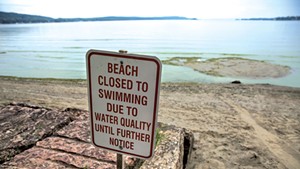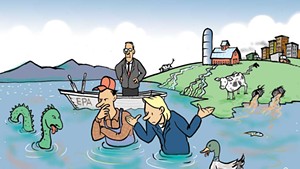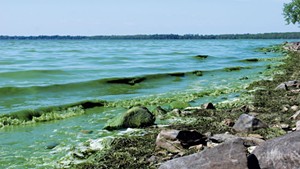
- File
- The town beach in St. Albans in summer 2016
Vermont is finally on track to meet federal funding requirements for the cleanup of the state's waterways.
The U.S. Environmental Protection Agency indicated in a letter Monday that a proposal put forth by Gov. Phil Scott’s administration passes muster. The determination is based on the assumption that the legislature will approve the funding plan.
Scott’s proposed state budget includes new funding for clean water from the estate tax, which is expected to provide $9 million or more each year.
The February 11 letter, signed by acting regional EPA administrator Deborah A. Szaro, is part of an ongoing effort to bring Lake Champlain and other Vermont waterways into compliance with the Clean Water Act. The state is under a federal order to reduce the amount of phosphorus that flows into the lake, which fuels smelly and potentially toxic algae blooms.
The federal stamp of approval marks a significant milestone for the Scott administration, which was
warned last year that the state’s continued failure to come up with a long-term funding plan could jeopardize its "provisional" passing grade on water cleanup. Under the Vermont Clean Water Act of 2015, Scott's administration
was required to release a long-term funding proposal by the end of 2017. The administration didn't come up with a proposal, frustrating last year's efforts to set up a funding source.
Legislators failed on that front, too. A funding proposal that passed the Vermont House
then died in the Senate and never made it to Scott for approval.
In the letter addressed to Vermont Natural Resources Secretary Julie Moore, Szaro wrote that Vermont’s plan is “a sensible framework that, if adopted, would meet the [EPA order’s] requirement to identify a long-term funding source.”
Moore provided
Seven Days a copy of the letter. She said the EPA was looking at a couple different aspects of Vermont's plan.
"One is the dollars, and they’re not commenting on the sources of the funding but rather the magnitude," Moore said. "And then the other one is that we have an approach to doing the work on the ground … to get to our water quality goals.”
Critics of the funding proposal, including Senate Natural Resources and Energy Committee chair Chris Bray (D-Addison), have said the estate tax is too volatile as a funding stream because it depends on revenue from the deaths of a tiny portion of the wealthiest people in Vermont.
In his budget address last month, Scott tried to head off such criticisms by pointing out that the tax reliably brings in millions — even if the amount varies widely.
“The estate tax is a stable source — average revenue since 2004 has been about $19.5 million, and the lowest year was 2015 at $9.9 million,” Scott said, according to prepared remarks. “Using a portion of this revenue for long-term investments makes a lot of sense.”
The proposal marked a change from Scott’s first term in office, when he expressed that he was “committed” to clean water but refused to put forward any specific long term funding plan.
Szaro’s letter said that the administration’s proposal ensured that Vermont will have needed clean water funds in future years, not just one-time spending.
“Significant portions of that funding would be dedicated by statute to clean water needs, and not subject to annual or biennial appropriation,” the letter said.
The EPA’s formal report card of all of Vermont’s efforts won’t come until June, Moore said. The agency is evaluating the state on dozens of criteria to ensure ongoing compliance with the water cleanup order.
See the full letter below:
















Comments (3)
Showing 1-3 of 3
Comments are closed.
From 2014-2020, Seven Days allowed readers to comment on all stories posted on our website. While we've appreciated the suggestions and insights, right now Seven Days is prioritizing our core mission — producing high-quality, responsible local journalism — over moderating online debates between readers.
To criticize, correct or praise our reporting, please send us a letter to the editor or send us a tip. We’ll check it out and report the results.
Online comments may return when we have better tech tools for managing them. Thanks for reading.